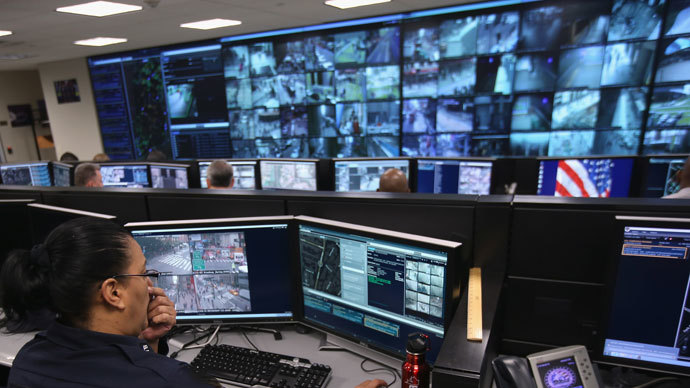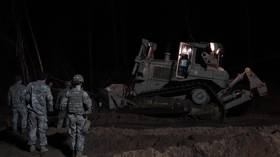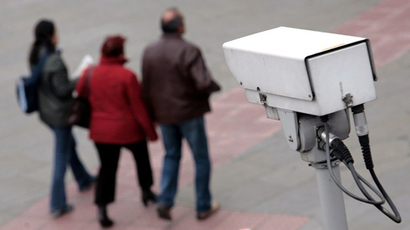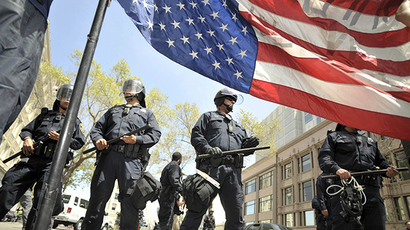Oakland moves forward with plans for Orwellian surveillance complex

Plans to finalize construction on a controversial high-tech surveillance hub in Oakland, California will continue as planned following a heated City Council meeting late Tuesday evening that stretched into Wednesday morning.
Lawmakers in Oakland voted 6-to-1 at the gathering to move
forward with plans pertaining to the city’s Domain Awareness
Center (DAC), an all-seeing intelligence-analysis complex that
when completed will link data captured by surveillance cameras,
gunshot detectors, license plate readers, Geographic Information
Systems mapping and social media feeds to provide law enforcement
personnel and emergency responders with 24/7 access to seemingly
all public activity within the town of 400,000.
The city intends on having the DAC fully operational by July
2014, much to the chagrin of privacy advocates who have
campaigned adamantly in recent months to try and halt officials
from moving forward with the project. This week, the City Council
indicated they have no plans to let those who object to the DAC
thwart its opening, which has already been put at risk following
news that the project’s previous contractor had broken a
little-known Oakland law dating back to 1988.
Tuesday’s meeting was held in order for the City Council to
decide whether or not a new contractor should be hired to
assemble the DAC in phase 2 of the construction after the
project’s previous builder, Science Applications
International Corp (SAIC), was found to be in violation of a
quarter-century-old statute that prohibits Oakland form doing
business with companies linked to the nuclear weapons industry.
The San Francisco Chronicle reported this week that officials in
Oakland will now examine bids from four other companies who have
previously answered to the city’s request for proposals —
Motorola Solutions, G4S, GTSI Inc. and Schneider Electric — but
Darwin BondGraham of the East Bay Express was quick to point out on
Tuesday that “a background check on each of these companies
shows that all of them have obtained nuclear weapons related
contracts from branches of the US military or from the US
Department of Energy.”
“Reopening the bidding process would take too long and the DAC
might not be completed on time to receive the funding,” added
BondGraham, who acknowledged that a federal grant worth $2
million unanimously approved by the council in July could be
jeopardized if Oakland officials do not act fast enough.
In all, the entire project is expected to come at a price tag of
roughly $10.9 million. But while federal grants aplenty are covering
construction of the facility, local residents of Oakland are
insisting quite vocally that the city should re-think plans to
put seemingly all public activity under the microscope of law
enforcement officials in real-time.
Tuesday’s meeting was only the latest City Council gathering
concerning the DAC, but not the first time that protesters came
out in droves to object to furthering the project. Police were
once again on hand at the event to eject unruly demonstrators,
and Council President Pat Kernighan eventually called on them to
clear the chamber after chants of “Shame! Shame! Shame!”
broke out after the vote was tallied.
According to the Chronicle, protesters had urged city officials
to delay their decision on whether or not a new contractor can
take the helms of the project by calling for the council to table
the motion.
"Nobody in Oakland wants to be monitored 24/7," Oakland
permaculture designer Ryan Rising told the paper. "I see it as
a pilot program for other cities to build their own surveillance
centers." The DAC page on the Oakland Wiki website estimates over 70 residents
signed up to speak at Tuesday’s meeting, which included the likes
of Parker Higgins of the Electronic Frontier Foundation, an
international non-profit digital rights group based in San
Francisco.
Here's me, just a few minutes ago, doing my best to speak truth to power against the #DAC at #oakmtgpic.twitter.com/jaLXNXVJ5H
— Parker Higgins (@xor) November 20, 2013
“At a time when mass surveillance is getting unprecedented
attention, it is unconscionable to push these plans forward
without robust participation,” Higgins said on the stand,
according to Jake Nicol of OaklandNorth.
When the protesters’ pleas were ignored and the council voted
almost-unanimously to approve a resolution that would let a new
contractor be hired, residents began a call-and-response chant
that lasted, according to the Chronicle’s Will Kane, until the
chamber was cleared.
"We are calling you out on an illegitimate decision-making
process in this city, that doesn't allow people to
participate!" the irate residents argued.
According to the Oakland Wiki, the city will expedite a request
for proposals regarding phase 2 in order to meet the terms of
eligibility set forth by the Department of Homeland Security with
regards to the government funding it is providing. This time,
interested contractors will reportedly have to show the council
that they are in compliance with the ordinance that prohibits
companies with nuclear weapons industry ties.















